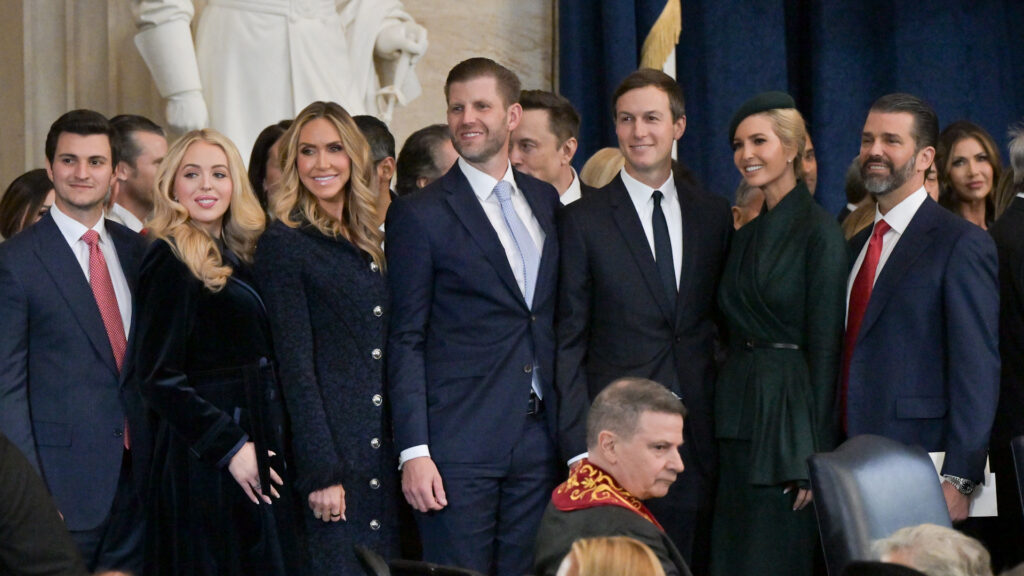President Donald Trump’s family and close advisers are expanding their business ventures across the Middle East as the administration prepares to announce significant investments from Gulf nations during the president’s trip to the region. Eric Trump announced towers opening in Dubai and Jeddah, expanding the family’s regional real estate footprint. He also recently unveiled plans for a luxury golf resort in Qatar at a government-linked development.
Eric has also indicated that the Trump Organization is planning future projects in Riyadh and possibly Abu Dhabi. Though the company claims its agreements are with private developers, many operate within state-owned or state-supported frameworks in the region.
How are Trump-aligned ventures tied to sovereign wealth funds?
Funds linked to the governments or royal families of Saudi Arabia, the United Arab Emirates and Qatar have poured more than $3.5 billion into Jared Kushner’s private equity fund Affinity Partners, according to The Wall Street Journal. A March 2025 regulatory filing showed Affinity’s assets jumped to $4.8 billion after a $1.5 billion cash injection from Qatar’s sovereign wealth fund and Abu Dhabi-based Lunate, according to Reuters.
Another $2 billion in UAE-backed stablecoin assets, issued by a Trump-affiliated crypto company, World Liberty Financial, was recently invested in the crypto exchange Binance.
World Liberty is controlled by an entity owned by the Trump family. Eric Trump sits on the board, and the president is featured on the company’s website as its “Chief Crypto Advocate.” So long as those tokens remain in circulation, World Liberty could generate tens of millions of dollars annually in profit, according to The Wall Street Journal. That revenue typically comes from interest earned on reserves backing the stablecoin.
Is there a link between business deals and policy negotiations?
Currently, the Trump administration is actively negotiating agreements with Gulf states for U.S. defense, AI and infrastructure agreements, in tandem with its efforts to secure regional peace deals and investment pledges. Saudi Arabia has committed $600 billion to the U.S., and the UAE has pledged $1.4 trillion over the next decade.
Unbiased. Straight Facts.TM
Saudi Arabia and the UAE have pledged $600 billion and $1.4 trillion, respectively, for U.S. projects over the next decade.

Why do Gulf states pursue these ties with Trump?
Experts cited by The Wall Street Journal say Gulf states like Saudi Arabia, the UAE and Qatar see Trump’s business and political ties as a key channel for gaining influence in Washington. Gulf leaders have supported public investments in U.S. projects and private deals tied to Trump’s circle. Experts say this level of overlap between private business and public policy is rare for a sitting U.S. president.
“They have a limited number of tools with which to shape the president’s views and policies on issues that matter to them most,” Hasan Alhassan, a senior fellow at the International Institute for Strategic Studies, said to The Wall Street Journal.
Despite criticism, the Trump administration maintains that it complies with all applicable laws. White House press secretary Karoline Leavitt said that the president “acts in the best interest of our country” and dismissed allegations of personal profiteering.
Is Qatar gifting Trump a presidential jet?
Administration officials are also in talks with Qatar about donating a Boeing 747-8, once used by the Qatari government, to temporarily serve as Air Force One, with reports suggesting that the aircraft may later be transferred to his presidential library.
In a Truth Social post, Trump said that the Defense Department would receive the Qatar-donated plane as a “gift,” and criticized Democrats for objecting to the arrangement. However, lawmakers and ethics experts raised alarms about potential violations of the U.S. Constitution’s emoluments clause, which prohibits presidents from accepting gifts from foreign states without congressional approval.
Rep. Jamie Raskin, D-Md., and Sen. Chris Murphy, D-Conn., said the plane deal could reflect a broader pattern of influence-buying. Some Trump allies also expressed concern. Activist Laura Loomer, known for her staunch support of the president, criticized the Qatari deal, citing risks of foreign lobbying and national security threats.
“I love President Trump,” Loomer wrote on X. “I would take a bullet for him. But, I have to call a spade a spade. We cannot accept a $400 million ‘gift’ from jihadists in suits. The Qataris fund the same Iranian proxies in Hamas and Hezbollah who have murdered US Service Members.”
What role does Pam Bondi play in the Qatar debate?
Attorney General Pam Bondi, who previously earned $115,000 per month as a foreign lobbyist for Qatar, is facing renewed scrutiny over her role in reviewing the legality of the aircraft deal. Democrats on the Senate Judiciary Committee argue that her prior financial ties raise questions about impartiality.
A Department of Justice memo reportedly concluded that the plane could be legally accepted through the Defense Department. Bondi and other officials argue that the arrangement does not violate constitutional restrictions because the gift is not tied to a specific act.
Qatar’s media attaché to the U.S., Ali Al-Ansari, said in a statement, “The possible transfer of an aircraft for temporary use as Air Force One is currently under consideration between Qatar’s Ministry of Defense and the U.S. Department of Defense, but the matter remains under review by the respective legal departments, and no decision has been made.”
contributed to this report.


